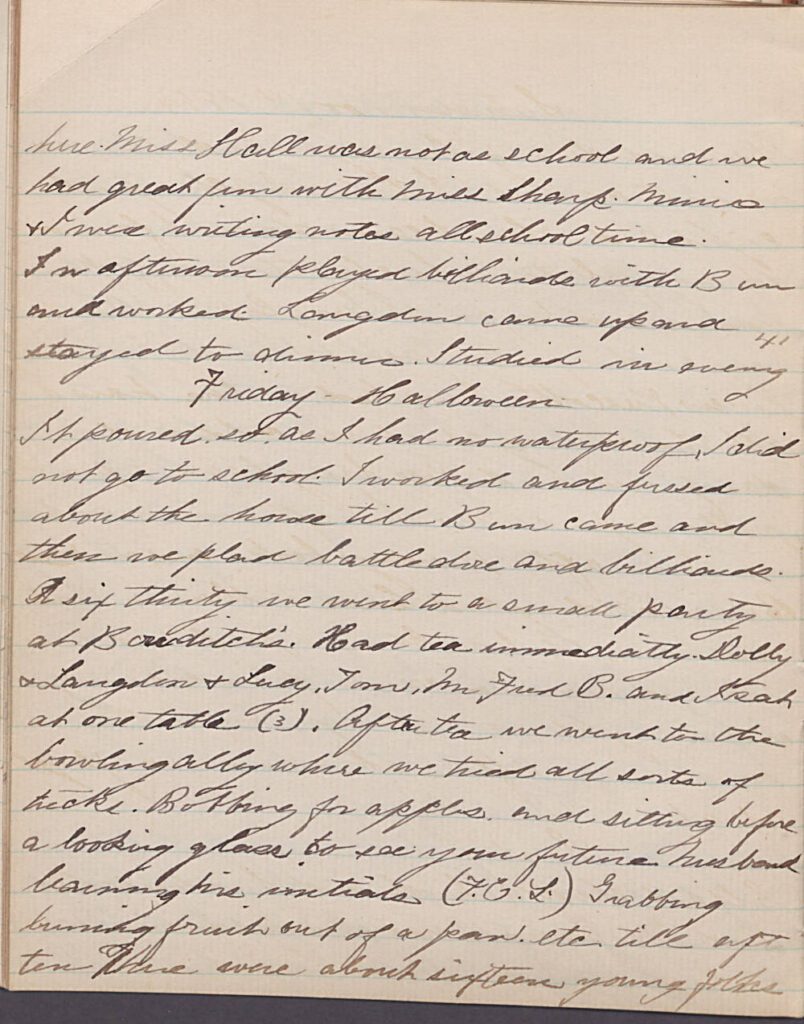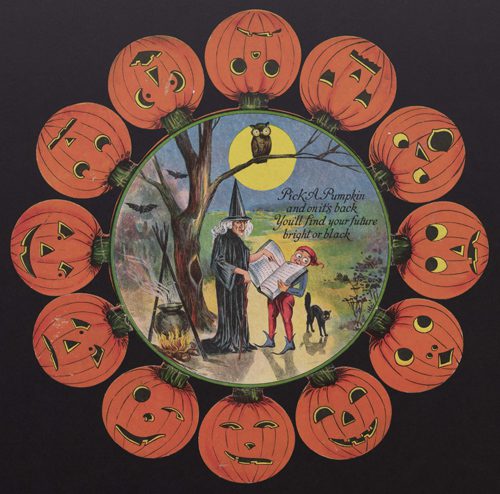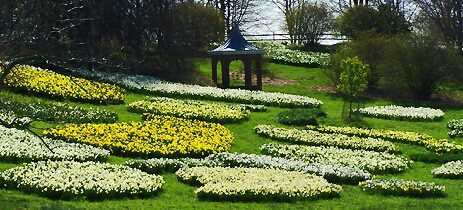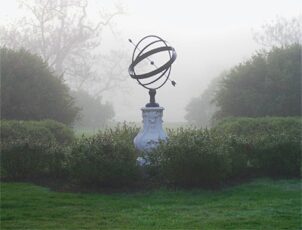For 14-year-old Helen Weld, Halloween in 1884 meant visiting a local bowling alley with friends where she bobbed for apples and saw her future husband’s initials (F.G.L.) in a mirror. Unfortunately, readers of Helen’s diary are left wondering if this prediction came true since the volume ends the following year.

Helen’s Diary
Friday – Halloween
It poured, so, as I had no waterproof, I did not go to school. I worked and fussed about the house till Bun came and then we plad battledore and billiards. At six thirty we went to a small party at Bowditch’s. Had tea immediately. Dolly & Langdon & Lucy, Tom, Mr Fred B. and I sat at one table (3). After tea we went to the bowling alley where we tried all sorts of tricks. Bobbing for apples and sitting before a looking glass to see your future husband learning his initials (F. G. L.) Grabbing burning fruit out of a pan, etc. till after ten There were about sixteen young folks…
Helen Weld, 1884
Divination games using common household items to predict future happiness, prosperity, and most importantly love were popular in the Victorian era, especially with young women like Helen. Bobbing for apples is still familiar to us now, but do we know the significance of the game? According to Victorian tradition, the first person to successfully grab an apple with his or her teeth would be the first to marry, and the first name spoken after the grab would be the lucky spouse. Apples were also pared in the hope that the peels would form the initials of future spouses after being thrown over shoulders.
Besides predicting marriage and spouses, apples also foretold happiness if thrown through a horseshoe, as directed in Sadie Josephine Dawson’s party games commonplace book of 1906. Apparently, Halloween celebrations and divination games had increased in number and specificity since Helen Weld’s time. Over the course of thirty pages, Sadie records a variety of games using not only apples but also pumpkins, raisins, candles, and needles and thread to foretell the future. She also includes party invitation verses and instructions, fortune sayings, and conundrums or riddles. One listed conundrum is “What nation produces the most marriages? Fa[s]cination.”

Pumpkin Game
Most likey circa 1900-1920, Grossman Collection, Winterthur Library.
Halloween games became big business in the early 1900s as evidenced by this printed pumpkin fortune-telling example. Although the saying hints at either “bright or black” futures, the twelve fortunes on the reverse are all bright ones, such as these two:
“Dame Fortune guides you night and day,
Your stars are pointing true;
Before a month has passed away
Great joy will come to you.”
“Your wedding month is June,
When flowers bloom their best,
And birds all sing a tune
Of sweethearts in their nest.”
May this Halloween bring you all good fortunes.
The Winterthur Library is filled with treasures such as these and offers programs throughout the year, including the Off the Shelf series spotlighting the Library’s collections of rare books, archives, and manuscripts. Join us for a Library Research Open House on October 19, and stop by to see the exhibition Winterthur Library Treasures.
In celebration of the season, we have reposted this blog post written by Jeanne Solensky, formerly the Andrew W. Mellon Librarian for The Joseph Downs Collection of Manuscripts and Printed Ephemera at the Winterthur Library, now Librarian of the Memorial Libraries at Historic Deerfield
 Winter Aconite
It seems as though spring has just started and already we are seeing signs of seed-ripening on our earliest bulbs; snowdrops, winter aconite and glory-of-the-snow.
Winter Aconite
It seems as though spring has just started and already we are seeing signs of seed-ripening on our earliest bulbs; snowdrops, winter aconite and glory-of-the-snow. 
 The March Bank is known for its stunning display of blue flowered glory-of-the-snow (Chionodoxa lucilliae) and Siberian squill (Scilla sibirica) that saturate the woodland bank—as well as many other parts of the garden—in late March.
The March Bank is known for its stunning display of blue flowered glory-of-the-snow (Chionodoxa lucilliae) and Siberian squill (Scilla sibirica) that saturate the woodland bank—as well as many other parts of the garden—in late March. May 1, 2008
The photograph above was taken this morning of the same area pictured below. We are on track to have beautiful azaleas for
May 1, 2008
The photograph above was taken this morning of the same area pictured below. We are on track to have beautiful azaleas for  April 29, 2008
April 29, 2008
 Now is the time to enjoy the fragrance and color of Winterthur’s lilacs in full flower in the Sundial Garden. This garden area was developed in the mid 1950s to create an April display of lilacs, quince, spiraea, and magnolia. The lilacs in flower now are hybrids of the common lilac, Syringa vulgaris. Their colors range from light yellow and pink through many shades of lavender and blue, all with a delightful fragrance.
Now is the time to enjoy the fragrance and color of Winterthur’s lilacs in full flower in the Sundial Garden. This garden area was developed in the mid 1950s to create an April display of lilacs, quince, spiraea, and magnolia. The lilacs in flower now are hybrids of the common lilac, Syringa vulgaris. Their colors range from light yellow and pink through many shades of lavender and blue, all with a delightful fragrance.  Winterthur’s daffodil display is one of the Brandywine Valley’s best kept secrets. Planted in drifts by the thousands, daffodils are a visual high note in the garden, flowering in between the peak displays of minor bulbs on the March Bank and azaleas and rhododendrons in Azalea Woods.
Planted along the main drive, Clenny Run, and Sycamore Hill, Winterthur’s sweeps of daffodils have remained much the same as when H. F. du Pont planted them. Narcissus had always been a favorite of Mr. du Pont’s, with some of the earliest plantings taking place in the March Bank by 1902. He developed a system of planting that revealed his plantsmanship and knowledge of design. He wrote in the Daffodil and Tulip Yearbook 1961, “Always plant the varieties separately. This is one of the essential and all-important lessons the intending planter must learn, as there can be no comparison as to the more pleasing effect of a bold expanse of one variety than that of a mixture.” Du Pont believed in informal beds, and used the curved and irregular shapes of tree branches to create the outlines for his daffodil sweeps.
The results of du Pont’s efforts are still enjoyed today and are a highlight of the spring landscape. A large part of the display can be enjoyed on your drive into Winterthur. The long drift of Narcissus ‘Queen of the North’ along Clenny Run, is just coming into full flower and can be seen to the right as you reach the bottom of the drive. The rest of the display can be seen near Sycamore Hill as you ride the garden tram or stroll through the garden.
Winterthur’s daffodil display is one of the Brandywine Valley’s best kept secrets. Planted in drifts by the thousands, daffodils are a visual high note in the garden, flowering in between the peak displays of minor bulbs on the March Bank and azaleas and rhododendrons in Azalea Woods.
Planted along the main drive, Clenny Run, and Sycamore Hill, Winterthur’s sweeps of daffodils have remained much the same as when H. F. du Pont planted them. Narcissus had always been a favorite of Mr. du Pont’s, with some of the earliest plantings taking place in the March Bank by 1902. He developed a system of planting that revealed his plantsmanship and knowledge of design. He wrote in the Daffodil and Tulip Yearbook 1961, “Always plant the varieties separately. This is one of the essential and all-important lessons the intending planter must learn, as there can be no comparison as to the more pleasing effect of a bold expanse of one variety than that of a mixture.” Du Pont believed in informal beds, and used the curved and irregular shapes of tree branches to create the outlines for his daffodil sweeps.
The results of du Pont’s efforts are still enjoyed today and are a highlight of the spring landscape. A large part of the display can be enjoyed on your drive into Winterthur. The long drift of Narcissus ‘Queen of the North’ along Clenny Run, is just coming into full flower and can be seen to the right as you reach the bottom of the drive. The rest of the display can be seen near Sycamore Hill as you ride the garden tram or stroll through the garden.  A week of sunny weather in April can give a gardener amnesia. Suddenly you find yourself planting as though it is May, forgetting that the nights can still get cold and turn your hard work into mush. Because today has been cool and cloudy I’ve already had two calls from gardeners asking for advice on frost. Keep in mind that it is not typically cool cloudy days that bring frost; frost is much more common on clear, cool nights with little wind.
Frost damages tender plants by causing cell walls to rupture. You can simulate the effect by putting a leaf of iceburg lettuce in a freezer for a minute. As the lettuce demonstrates, the leaves of a frost damaged plant wilt as though they have been crushed and will not recover on thawing. To keep frost at bay you can use any number of simple strategies. Begin by watering your plants thoroughly during the day, as water and soil are effective thermal masses that will help keep the micro-climate around your plants warmer. If your plants are in pots or trays, move them into a garage or shed for the evening. Alternatively, cover plants with sheets/blankets, paper/newspaper, or sheets of plastic. You can use stakes distributed throughout your beds to hold the covers off of the foliage of your plants. Remember to remove covers as the sun comes out the next day to prevent overheating. If your plants are damaged, but not killed, you can clip out the frost-damage and they should be fine.
A week of sunny weather in April can give a gardener amnesia. Suddenly you find yourself planting as though it is May, forgetting that the nights can still get cold and turn your hard work into mush. Because today has been cool and cloudy I’ve already had two calls from gardeners asking for advice on frost. Keep in mind that it is not typically cool cloudy days that bring frost; frost is much more common on clear, cool nights with little wind.
Frost damages tender plants by causing cell walls to rupture. You can simulate the effect by putting a leaf of iceburg lettuce in a freezer for a minute. As the lettuce demonstrates, the leaves of a frost damaged plant wilt as though they have been crushed and will not recover on thawing. To keep frost at bay you can use any number of simple strategies. Begin by watering your plants thoroughly during the day, as water and soil are effective thermal masses that will help keep the micro-climate around your plants warmer. If your plants are in pots or trays, move them into a garage or shed for the evening. Alternatively, cover plants with sheets/blankets, paper/newspaper, or sheets of plastic. You can use stakes distributed throughout your beds to hold the covers off of the foliage of your plants. Remember to remove covers as the sun comes out the next day to prevent overheating. If your plants are damaged, but not killed, you can clip out the frost-damage and they should be fine.  On the second Saturday of each month, one of our staff members leads a walk highlighting something special in the garden or on the estate. These
On the second Saturday of each month, one of our staff members leads a walk highlighting something special in the garden or on the estate. These